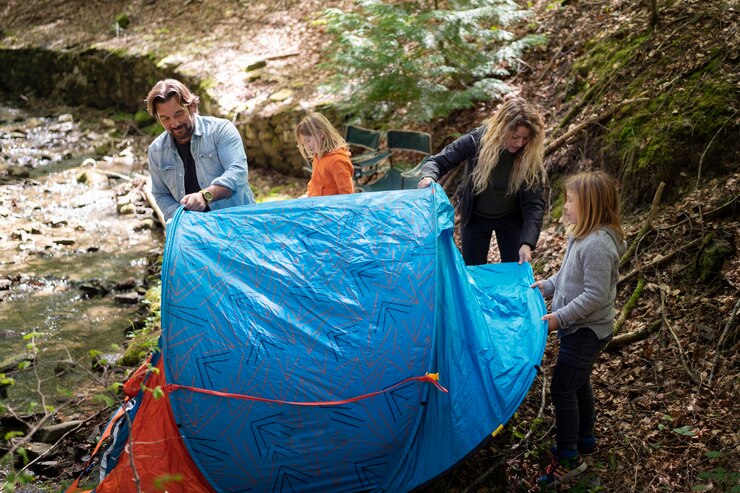Camping is a fantastic way to reconnect with nature, escape the hustle and bustle of everyday life, and enjoy the great outdoors. However, one of the biggest challenges for many campers is maintaining personal hygiene during their outdoor adventures. While being close to nature is rejuvenating, going without a shower for several days can be uncomfortable. This is where camping showers come in handy. In this guide, we will explore everything you need to know about camping showers, including the different types, how to choose the best one, tips for using them, and why they are an essential part of your camping gear.
Why You Need a Camping Shower
Camping is about simplicity and living with the basics, but personal hygiene should not be compromised. Here’s why you need a camping shower:
Comfort and Cleanliness
: After a long day of hiking, swimming, or just exploring the outdoors, nothing feels better than a refreshing shower. A camping shower helps you rinse off sweat, dirt, and grime, ensuring you stay clean and comfortable during your trip.
Health and Hygiene
: Staying clean is essential for your health. Dirt and sweat can lead to skin irritations, infections, and other health issues if not washed off regularly. A camping shower allows you to maintain your hygiene even when you’re miles away from civilization.
Environmental Responsibility
: Using a camping shower can be more environmentally friendly than bathing in natural water sources. Soaps and shampoos can contaminate lakes and streams, but with a camping shower, you can control where the water goes and ensure that you’re not harming the environment
Types of Camping Showers
There are several types of camping showers available on the market, each designed to meet different needs and preferences. Below are the most common types:.
Solar Showers
Solar showers are a popular choice among campers due to their simplicity and effectiveness. These showers consist of a black bag that absorbs heat from the sun, warming the water inside. Solar showers are lightweight, easy to use, and don’t require any external power source, making them ideal for remote camping locations.
- Pros: Eco-friendly, lightweight, and affordable.
- Cons: Dependent on sunlight, limited water capacity, and can take several hours to heat up.
. Propane-Powered Showers
For those who prefer a more luxurious camping experience, propane-powered showers offer a consistent and instant hot water supply. These showers use a small propane tank to heat the water, providing a steady flow of warm water on demand. They are great for colder climates where solar showers might not be effective.
-
Pros
- : Provides instant hot water, great for cold weather, and can be used at any time of day.
-
Cons
- : Heavier and bulkier, requires fuel, and more expensive.
. Battery-Powered Showers
Battery-powered camping showers are another convenient option. These showers use a battery-operated pump to draw water from a container and push it through a showerhead. They offer decent water pressure and are easy to use, making them a good choice for car camping or trips where you have access to batteries.
-
Pros
- : Portable, provides good water pressure, and easy to use.
-
Cons
- : Requires batteries, limited water supply, and may need frequent battery replacements.
. Pump-Action Showers
Pump-action showers are manual and require you to pump air into a container to pressurize the water. Once pressurized, the water flows through a hose and out of a showerhead. These showers are durable, portable, and don’t require any fuel or batteries.
- Pros: Durable, portable, and doesn’t require fuel or batteries.
- Cons: Requires manual effort to pressurize, limited water capacity.
How to Choose the Best Camping Shower
When choosing a camping shower, consider the following factors to ensure you select the one that best meets your needs:
. Water Capacity
The size of the water container is crucial, especially if you’re camping in a remote area with limited water access. Consider how many people will be using the shower and how long your trip will be. Larger water containers will provide more showers but will also be heavier and bulkier to carry.
. Heating Method
Consider the climate and weather conditions where you’ll be camping. If you’re camping in a sunny area, a solar shower might be sufficient. However, if you’re camping in a colder climate or prefer instant hot water, a propane-powered shower might be a better choice.
. Portability
If you’re backpacking or hiking, you’ll need a lightweight and compact camping shower that’s easy to carry. In this case, a solar or pump-action shower might be the best option. For car camping or base camps, you can afford to bring a heavier, more luxurious shower like a propane-powered model.
. Ease of Use
Consider how easy the shower is to set up and use. Some camping showers require minimal setup, while others might need more time and effort. If you want something simple and quick, opt for a solar or battery-powered shower.
. Durability
Your camping shower should be durable enough to withstand the rigors of outdoor use. Look for showers made from high-quality materials that are resistant to punctures, leaks, and wear and tear.
Tips for Using a Camping Shower
To make the most of your camping shower, follow these tips:
. Conserve Water
Water is a precious resource when you’re camping, especially in remote areas. Try to conserve water by taking shorter showers and turning off the water while you soap up or shampoo. If possible, use biodegradable soap to minimize your impact on the environment
. Set Up in a Shady Area
If you’re using a solar shower, setting it up in a sunny spot is essential for heating the water. However, when it’s time to shower, move the shower to a shaded area to keep the water from cooling down too quickly and to make the showering experience more comfortable.
. Use a Privacy Tent
For added comfort and privacy, consider bringing a pop-up privacy tent. These tents provide a private space for showering and changing clothes, and they can also help protect you from insects and wind while you shower.
. Plan Your Shower Time
Plan your shower time when the water is warmest if you’re using a solar shower. Usually, this will be in the late afternoon after the water has had several hours to heat up in the sun. For propane or battery-powered showers, you can shower at any time of day, but it’s still a good idea to plan ahead to ensure you have enough water.
Environmental Considerations
While camping showers can significantly improve your outdoor experience, it’s essential to use them responsibly to minimize your environmental impact. Here are some considerations to keep in mind:
. Use Biodegradable Soap
Regular soap and shampoo can harm the environment, especially when used near water sources. Always use biodegradable soap specifically designed for outdoor use, and avoid using it directly in natural water bodies.
. Dispose of Water Properly
When disposing of your used water, do so at least 200 feet away from any water sources to prevent contamination. If possible, dig a small hole to disperse the water into the ground, which will help filter out any remaining soap residue.
. Leave No Trace
Remember the Leave No Trace principles and ensure that you leave your campsite as you found it. Avoid trampling vegetation when setting up your shower, and pack out all trash and personal items.
Conclusion
A camping shower can make a significant difference in your camping experience, providing comfort, cleanliness, and convenience in the great outdoors. Whether you prefer a simple solar shower or a more luxurious propane-powered model, there is a camping shower to suit every camper’s needs. By considering the type of shower, its water capacity, portability, and ease of use, you can choose the perfect shower for your next adventure. Remember to use your camping shower responsibly to protect the environment and ensure that future generations can enjoy the same pristine wilderness that you do. With the right camping shower, you can stay fresh and clean, no matter how far you venture into the wild.





